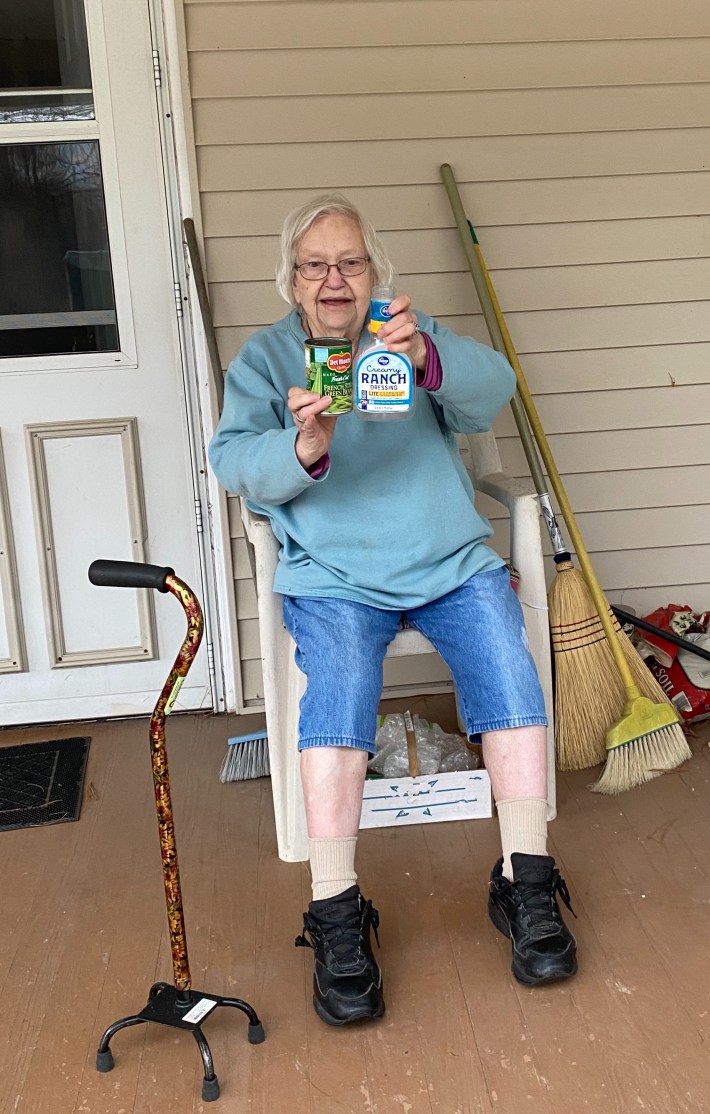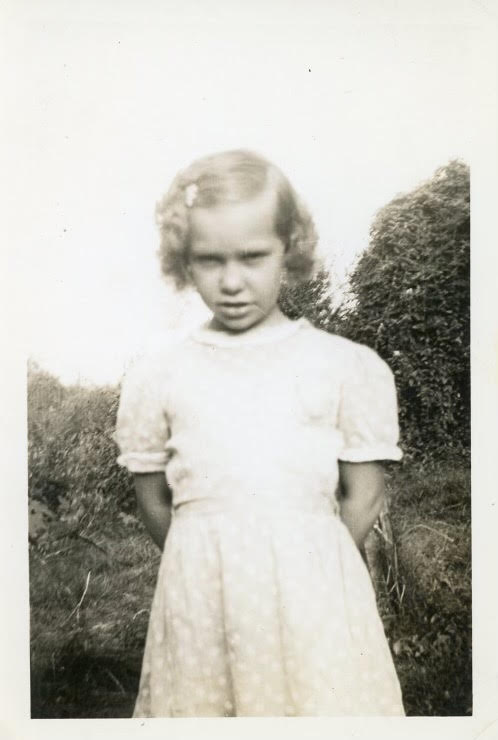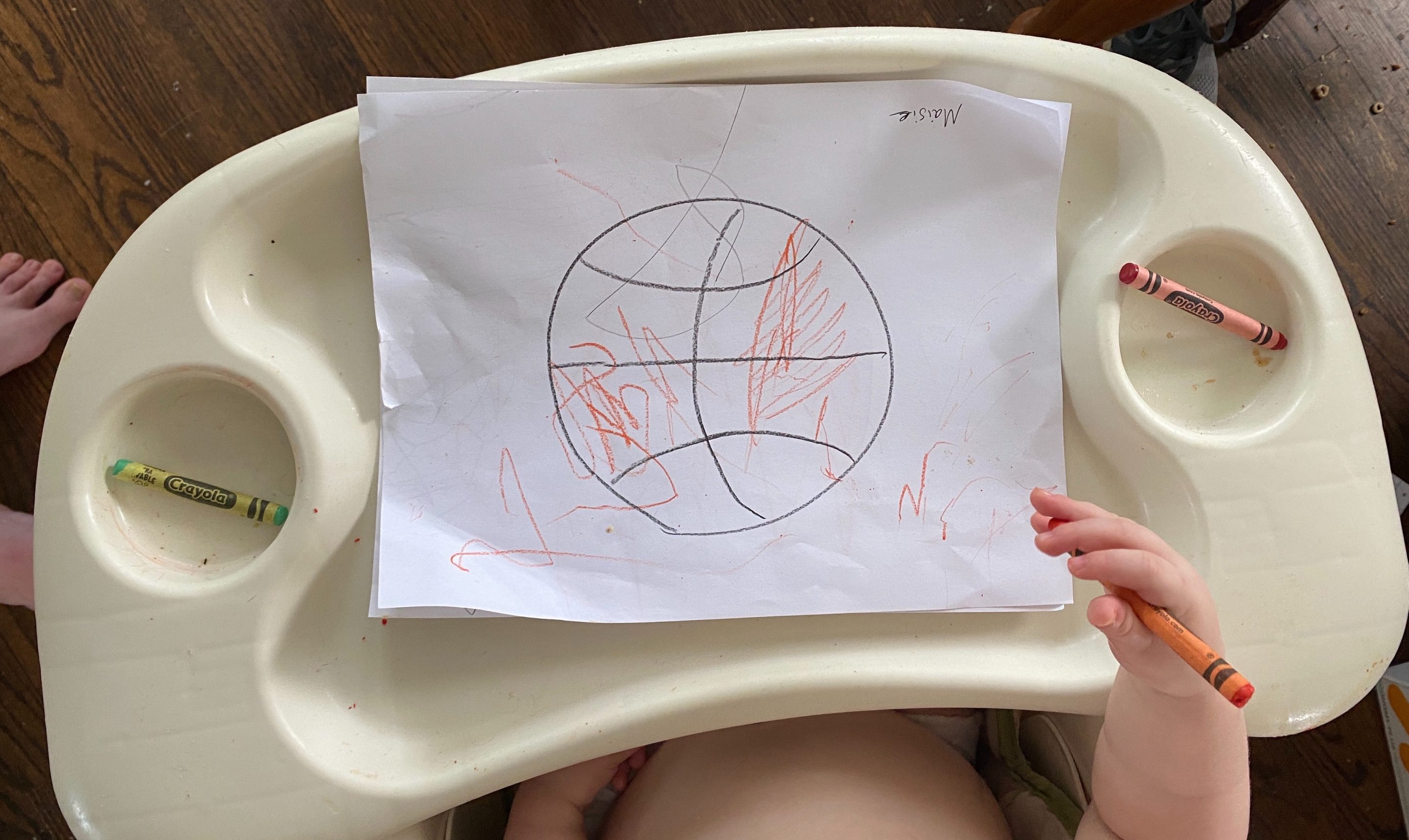Iris Clawson died last week. She was 87 years old.
You might remember Iris from two stories I wrote for the old Deadspin. She was my elderly neighbor with “the only good NBA takes”—someone who watched the league five nights a week, who delighted in Lance Stephenson joining the Lakers (“I guess he’ll have more chances to blow in LeBron’s ear”), who could outflank any Pacers hipster (Vogel > McMillan, she believed, but Carlisle > both). After the first story, you readers overwhelmed Iris with kindness. They mailed her basketball cards and chipped in for a bigger TV, to help with her fading eyesight; one person bought her 10th-row tickets to a Pacers game, an unforgettable night I described in the second story. Even Mike Breen emailed to ask for Iris’s number. “We had a nice little chat,” she told me. “He asked me if I liked the announcers, and I said I don’t really pay close attention to them. He got a good chuckle out of that.”
When the pandemic started, Iris took it in stride, like she did everything else. Her favorite responses were always “Can’t complain!” and “No, don’t need a thing.” But she also took it seriously. She was a diabetic and a three-time cancer survivor, so she stopped going to Kroger and to her doctors’ appointments, which kept getting delayed anyway. She stopped inviting neighbors inside the bungalow where she’d lived since 1979. At least she still had that house and the independence it provided. But Iris knew she couldn’t stay there forever. The year before she’d asked another neighbor, Danielle, to show her a nearby nursing home. Iris toured a few rooms and talked basketball with one of the aides. A couple months later, when she had to buy a new bed, Iris made sure to choose a smaller one that could fit in those rooms. “She was planning for it,” Danielle says. “She just hadn’t decided yet that she was ready to give up her house.”
So Iris adapted. Before the pandemic I would take my kids, who are 2 and 4, to hang on her couch. Sometimes, they tried (and failed) to count all of the owl decorations on her walls. Sometimes, they did puzzles. Iris loved thousand-piece puzzles, but she also kept some smaller ones for the kids.
Starting last March, though, we talked to Iris from the sidewalk. Whenever we went on a walk I would call her first, giving her time to grab her walker and maneuver onto the porch. The kids would run in her yard and jump off her bottom step. After a week or two, I noticed that she had quietly moved her planters off the stairs, to create a better runway for the kids.
It was a good routine—as good as anything could be in those early months of the pandemic. Everyone on our street seemed to be buying Iris groceries. When I brought her an inferior brand of green beans, she made me take a picture of her favorite so I could get it right next time.

She was stubborn but grateful, guarded but warm. She was also the most isolated she’d ever been.
Once the NBA launched its bubble, in late July, I printed her a fresh schedule. She was excited for basketball’s return. But one morning, early in the seeding games, I called before a walk and didn’t get an answer. At first I thought, no big deal—she’s probably taking a nap. After lunch I called again and then knocked on her door. Something felt off, so I used a spare key she’d given me to let myself in the back, where she kept her washer and dryer. “Iris, it’s me,” I yelled, but I didn’t need to—she was sprawled on the floor right in front of me. She’d been lying there for at least 12 hours.
I still remember how scared she looked—eyes dilated, body soaked in urine and sweat. The night before, she’d put down her cell phone and Life Protect button to prep for bed, then remembered she needed to switch the laundry. She fell on the way, which was bad enough, but on the floor were a pair of rusty pruning shears. (Iris refused to get rid of anything.) She landed on them, cutting a deep gash in her leg.
I got her into a chair, got her some water, wiped up the blood. Then I called Danielle, who was out of town. I called John, who’s the closest thing Iris had to a son; he was the child of a single mom Iris used to work with, a guy Iris had once babysat and who now, three decades later, was still mowing her grass. John couldn’t come because he was in the middle of a bad case of COVID, but he called Dennis, Iris’s great-nephew and closest actual family member. Dennis rushed over and, seeing Iris, decided to take her to the hospital. It was the last place you wanted to take an octogenarian during a pandemic. But what other choice did he have?
John eventually got better, except for his sense of smell. Iris didn’t. At the hospital they found a nasty sore on her bottom—a wound so deep you could put your fist in it. It was baffling that Iris had never mentioned it to anyone. It was even more baffling when she began undermining her own treatment. In the past, she’d been as particular about prescriptions as she was about green beans, but now whenever Iris’s nurses put a wound vac on her sore, she ripped it out.
Part of the reason Iris did this was surely what she said, that the wound vac was uncomfortable, that it made it hard for her to stay mobile in her wheelchair. But part of it may have been her deteriorating mind. For a while, friends had noticed her repeating or forgetting things. Iris had noticed this herself. One time, after John had finished mowing, she’d asked him to write down the numbers of her favorite TV channels.
“Don’t you know them already?” he asked.
“Not always,” she admitted.
Iris was fighting a physical battle and a mental battle, with each bleeding into the other. Still, she wanted to live at home as long as possible. After a carpenter built a wheelchair ramp over her front steps, Dennis brought her back to the house where he’d once gone for holidays. (Iris would give you a present and then hide $20 inside the present, too.) Every day Dennis or his wife Misty came to check on Iris at breakfast, lunch, and dinner. At some meals Iris didn’t remember the day’s earlier visits. She struggled with incontinence. She fell even more frequently. She continued to tear out her wound vac.
After a week of that, Iris headed to a nursing home. “I know this has to happen,” she told Dennis, “but I just wish I could stay home.” The staff decorated her room with owls and a plant; my kids colored pictures of basketballs and mailed them to her. But Iris hated losing her freedom and her routines. Moving to a new place made it even harder to remember what day it was or who she was talking to, especially since COVID meant no in-person visitors. The table that came with the room was too small to fit a thousand-piece puzzle.
When I called her, I could hear flashes of the old Iris. “I’ve got a big sore on my butt,” she’d say with a laugh, “but I’ll be home one of these days.” She told me that the nursing home didn’t have hair dryers but that she’d improvised by cranking her thermostat and leaning over the heat vent. I told her that her wheelchair ramp had become the street’s biggest attraction, with my kids running up and down it and squealing the whole time. She didn’t seem to be watching much basketball anymore, but in November I made sure to fill her in on Klay Thompson’s Achilles tear since he was her favorite player. “I remember that name,” she said, “but I can’t put a face to it.”
A few weeks after Christmas, and after Iris and the other residents had been vaccinated, the nursing home began allowing a small number of visitors. Dennis and Misty brought Iris her favorite card table and some thousand-piece puzzles, but she never took them out. On many days she seemed tired and irritated, especially (and understandably) when the staff had to debride her wound. She didn’t want to try surgery. She didn’t want to eat. When the staff mentioned a gastronomy tube, Iris wrinkled her face: “I don’t want that.”
On Easter Sunday, no one could get Iris to wake up. John and Danielle managed to slip into the nursing home near the end of the day, and when John asked Iris if she was in pain, she shook her head slightly. Other than that, she didn’t respond at all. So they sat and talked about Iris—about whether she would have stayed happier and sharper if she could have been around more people, about whether she might have confided in one of them about her secret wound if only they’d been sitting together like they used to, visiting on her old couch.
I didn’t hear about Iris’s turn until that night, and I spent most of Monday on the phone with the nursing home, learning about COVID occupancy limits and begging to see her even if I wasn’t technically family. I finally got a visit approved for first thing Tuesday morning. Before I got in the car, I walked down to Iris’s house and picked a few flowers from her garden. I knew that she probably wouldn’t even open her eyes, but I wanted to bring her something from her home.
When I got to the nursing home, the nurse at the desk told me that Iris had passed a couple hours earlier.
The first thing I saw at the funeral home—before I saw the casket, before I saw Iris tucked in with an owl blanket—was a table holding two small puzzles. At some point, Iris had won them at the nursing home’s bingo game. She’d been saving them for when she could see my kids again.
Dennis came over and hugged me, because I was already crying pretty hard. “Every time I talked to her,” he said, “she would get after me—don’t you lose those kids’ puzzles.” No matter how cross she got, no matter how much she forgot, she would still tell stories about my kids jumping off her stairs and wearing out her ramp, right until the very end.

When I finally pulled it together long enough to thank Dennis for the work he’d done, he hugged me again. “It wasn’t hard,” he said. “It was easy. We wanted to do more, and we couldn’t. That’s the part that sucked.”
Iris Clawson lived a good life, and she died a hard and lonely death. But John and Dennis and Danielle and everyone else who knew her would say the same thing: She gave us more than we gave her.






